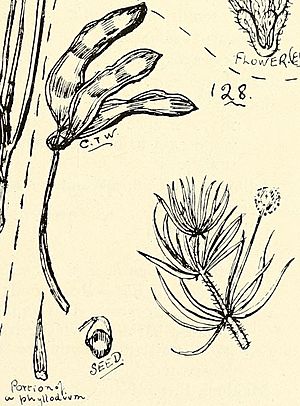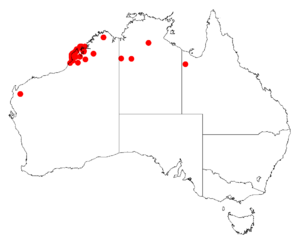Acacia hippuroides facts for kids
Quick facts for kids Acacia hippuroides |
|
|---|---|
 |
|
| Illustration of Acacia hippuroides | |
| Scientific classification | |
| Genus: |
Acacia
|
| Species: |
hippuroides
|
 |
|
| Occurrence data from AVH | |
Acacia hippuroides is a special type of shrub, a bit like a bush, that belongs to the Acacia family. It's found only in the northwestern part of Australia. This plant is unique because it has unusual "leaves" called phyllodes, which look a bit like tiny branches.
What Does It Look Like?
This spreading shrub usually grows to be about 0.3 to 1.6 metres (1 to 5 ft) tall. Its branches are covered in soft, yellow, woolly hairs, about 0.5 mm (0.020 in) long. It also has small, pointy parts called stipules, which are 1 to 2 mm long.
Instead of regular leaves, Acacia hippuroides has "phyllodes." These are like flattened stems that do the job of leaves. The phyllodes grow in groups of 12 to 15, forming a circle. They are curved and have a groove on top. Each phyllode is about 12 to 20 mm (0.47 to 0.79 in) long and very thin, only 0.3 to 0.4 mm (0.012 to 0.016 in) wide.
The plant blooms from March to October, showing off its bright yellow flowers. These flowers grow in round or oval-shaped clusters, with 30 to 40 flowers in each cluster. After the flowers, the plant grows flat, curved seed pods. These pods are about 25 mm (0.98 in) long and 8 to 15 mm (0.31 to 0.59 in) wide. Inside, the seeds are about 4 mm (0.16 in) long and are arranged sideways.
How Was It Named?
Scientists first officially described Acacia hippuroides in 1842. This happened when Robert Heward and George Bentham wrote about it in a scientific paper. Later, in 2003, another scientist named Leslie Pedley reclassified it, giving it a different scientific name, Racosperma hippuroides. However, in 2006, it was moved back to the Acacia group, which is where it remains today.
Where Does It Grow?
This shrub is native to the Kimberley region in Western Australia. You can often find it growing on rolling plains, rocky hills, and mountain ranges. It prefers red sandy soil or thin soil over quartzite or sandstone rocks.
Most of these plants grow in coastal areas of the west Kimberley. They can be found from the Dampier Peninsula in the south, up to the Buccaneer and Bonaparte Archipelagoes in the north. They are usually part of woodland and shrubland areas, sometimes growing where water seeps into the ground.
See Also
- List of Acacia species

